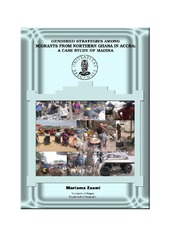Gendered Strategies Among Migrants From Nothern Ghana in Accra: A Case Study of Madina
Master thesis
Permanent lenke
https://hdl.handle.net/1956/4425Utgivelsesdato
2010-05-18Metadata
Vis full innførselSamlinger
- Department of Geography [676]
Sammendrag
The high level of migration of people from Northern to Southern Ghana is rooted in historical antecedents. The general objective of this study is to explore the gendered strategies of migrants from Northern to Southern Ghana through social networks for the purpose of gaining access to the informal economy. The specific objectives are to examine (a) gender differences in the reasons for migration from Northern Ghana to the study area in Madina (a suburb of Accra); (b) gender differences in types of, and support from, social networks; and, (c) examine the differences in the economic opportunities and constraints that migrants encounter in the study area of Madina.The conceptual framework I used in this thesis have been derived from theories of gender (Cope 2002; Moore 1988), ethnicity (Barth 1969; Cohen 1969, 2004), and social networks (Granovetter 1983, 1995). From a gender theoretical view, women and men are affected by migration differently. So, with the feminist epistemology the reasons of migration and social network used are looked at. The concept of ethnicity was used to analyze how diverse ethnic groups from the Northern Region support migration process and also help migrant's adapt to their new environment. The concepts of strong ties' and weak ties' within the social networks theory is used to identify and analyse the extent to which migrants made use of the strong ties (kinship relations) or weak ties (which includes friendship and ethnic groups).A sample size of 58 migrants, comprising 37 females and 21 males, were interviewed. The emerging findings from the study include the following. There are gender differences in (i) access to social networks; (ii) occupations available to migrants and, (iii) opportunities and constraints opened to women and men. With regards to social networks, the social ties women used were kinship relations (such as parents, cousins, siblings) in migrating. However, when they arrived in the study area, many of them moved out from these kinship ties to join friendship ties and ethnic group membership. In contrast, the men migrate normally with friends and seek the help of their ethnic groups in Madina to have access to economic opportunities. When it comes to the role of ethnicity in migration, both women and men relied on ethnic ties in getting access to accommodation and jobs in the study area. These and other empirical findings are discussed in the thesis.
Utgiver
The University of BergenOpphavsrett
The authorCopyright the author. All rights reserved
